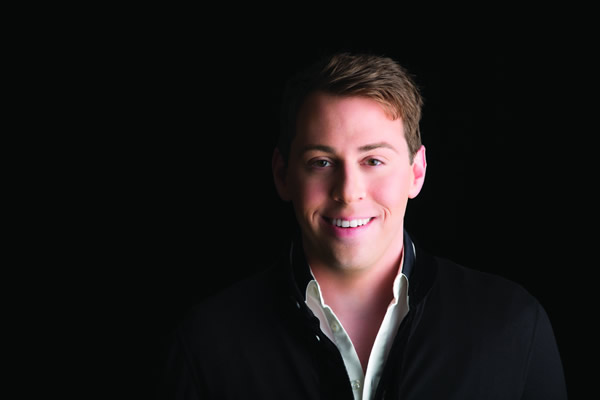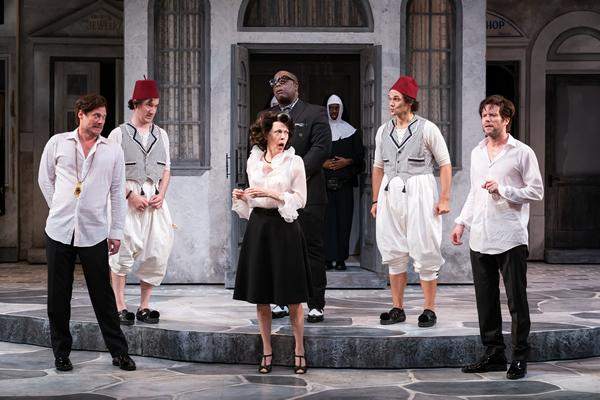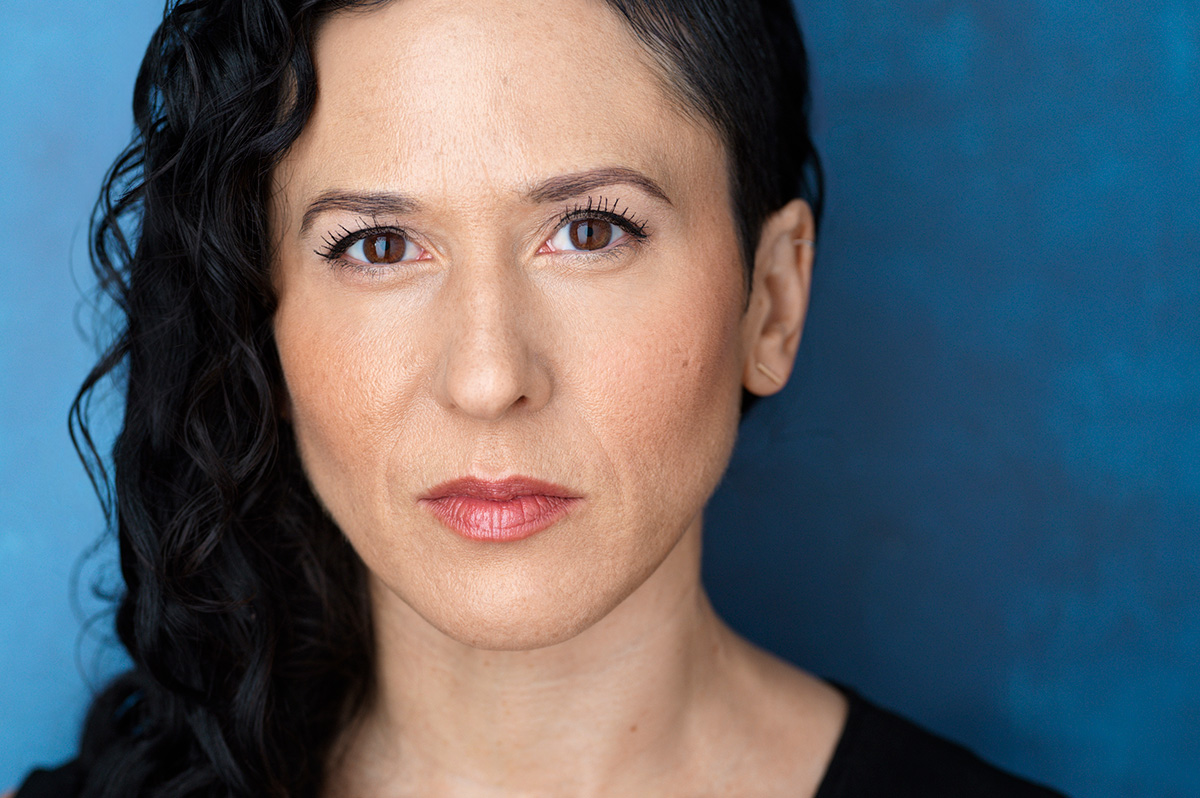Theater
Director Alan Paul enjoying frothy romp ‘The Comedy of Errors’
Theater bug bit Michael Kahn protege at young age


Alan Paul says a ‘60s Greek aesthetic has informed much of his work. (Photo courtesy STC)
‘The Comedy of Errors’
Through Oct. 28
Shakespeare Theatre Company
at Lansburgh Theatre
450 7th St., N.W.
$44-118
Director Alan Paul came out at just 15. He was the last of his group at performing arts camp to come clean on his sexuality. The rest had all come out at about 12, he says. Paul felt quite left behind. Certainly he’s never been behind professionally.
At 25, Paul was named Shakespeare Theatre Company associate artistic director under the auspices of legendary STC Artistic Director Michael Kahn. Now 34, Paul boasts an impressive CV crammed with work on classics, opera and musicals. He’s been nominated for several Helen Hayes Awards for directing and won for STC’s “A Funny Thing Happened on the Way to the Forum.” His more recent production of “Camelot” has broken STC box office records.
Growing up in nearby Potomac, Md., Paul made frequent trips to New York to see Broadway musicals. He loved “Sunset Boulevard” with Glenn Close as Norma Desmond but was verily obsessed with the London cast recording featuring Patti LuPone as the reclusive silent film star. From an early age, Paul longed to be a part of the theater world and struck up correspondences with many Broadway professionals. After graduating from Northwestern University where he was in the musical theater program, Paul returned to his hometown to pursue a career in earnest. He splits his time between Washington and New York where he’s often called to meet with designers and audition actors.
Currently, Paul is staging STC’s production of Shakespeare’s early work “The Comedy of Errors,” a farce jam-packed with slapstick and mistaken identity revolving around two sets of identical twins. A twin himself, Paul felt instantly at home with the work’s situations and possibilities.
Recently he took a break from tech week to talk about his latest directorial effort and other things.
WASHINGTON BLADE: I read that you wanted to plumb the work for its romantic and elegant elements. True?
ALAN PAUL: Those were early words. When you see the fart jokes you won’t think elegance. It’s a difficult play because it has to be funny but it also has to be about real people. The characters are searching for lost loved ones. The premise is deep. The comedy of it is what happens in the course of this crazy 24 hours. But there is elegance in the physical production. I wanted a mostly black-and-white set and costumes. I’m inspired by films from the early ‘60s like the Greek romantic comedy “Never on a Sunday” starring Melina Mercouri.
BLADE: Is it wrong to associate you primarily with musicals?
PAUL: I’ve directed many plays but musicals have been the most visible thing I’ve done. I love both. It’s fun to jump back and forth. In addition to Michael (Kahn), my heroes include Jack O’Brien. He directed “Hairspray” and “Henry IV” on Broadway in the same year. And Michael Blakemore who on the same night won Tony Awards for directing a play and a musical, “Copenhagen” and a revival of “Kiss Me, Kate,” respectively. People mistakenly think a director of musicals can’t be serious or real. Or a play director can’t be fun. I try really hard to play both sides of that. For “The Comedy of Errors,” we’re including some original music. It’s about creating that ‘60s Greek feeling. Also, the cast includes Eleasha Gamble who plays the courtesan and owner of the Porcupine Club. How could I not give her a song?
BLADE: You’re a twin. Has that been your way into “The Comedy of Errors”?
PAUL: Yes, I have a twin sister. For me, I understand the bond with my sister. The bond is different from what I have with anyone else. We share a sense of humor. If you looked at our text messages you’d have no idea what it means but we think it’s hilarious. Twins figure into so many of Shakespeare’s plays. I think Shakespeare had twins and one of them died. This play, and “Twelfth Night” especially, is about needing to find your other half. Shakespeare had a fantasy of family coming back together that never happened. I believe it comes from an extraordinary sense of loss.
BLADE: How did you go about casting twins?
PAUL: I’ve cast two sets of twins who look nothing alike. Put the same hat on them and who cares? We get it.
BLADE: Tell me about how Michael Kahn hired you.
PAUL: It was over drinks at Playbill Café. I miss that place so much. Not a big deal for him, but life changing for me.
BLADE: This is Michael Kahn’s last season at STC. What has he taught you?
PAUL: He pushed me very hard when I was very young to run the department. He gave me a lot of responsibility and expected me to know what I was doing. I figured out how to do it and I think that he gave me a lot of confidence early on. Also, I will take away his incredibly high standards. He won’t let anything go that does meet a certain standard. And I have that myself. An internal GPS that says “not good enough.”
BLADE: Will you work under Kahn’s appointed successor, Simon Godwin?
PAUL: That’s an ongoing conversation. I like him and am excited to see what he’ll do.
BLADE: Was directing The Comedy of Errors your choice?
PAUL: STC wasn’t doing a musical this season so I knew I’d do a play. I really wanted to do Shakespeare so Michael and I talked about a lot of different titles. Comedies to dramas. We hadn’t done this one in a long time. I thought it was a great way to open the season and I wanted to assemble a group of funny people that the audience would know. It’s always fun to have artists on stage together who have contributed to the success of STC. People like Tom Story, Nancy Robinette, Ted van Griethuysen, Sarah Marshall.
BLADE: And don’t forget Veanne Cox as Adriana.
PAUL: Yes, wait until you see her arguing with a parrot. She has a pet bird that talks to her.
BLADE: Last season you broke Shakespeare Theatre Company sales record with your production of “Camelot.” How do you explain that?
PAUL: The election. I’d been uncertain about doing “Camelot.” People love the music but not so much the book. But when Hillary Clinton lost the election, I couldn’t help but wonder what Obama was thinking about his legacy. That’s what King Arthur goes through at the end of the play. When the Round table is cracked he says that barbarism is the natural state of man. Then at the end of the scene he meets the kid and his spirit is revived. I thought that’s the story Washington needed to hear. And I was right.
BLADE: There are so many shows opening right about now. Why see “The Comedy of Errors”?
PAUL: Well, it’s short — 95 action-packed minutes. Nobody wants to see a really long play. With this production, you’re out in time to get drinks or supper. Also, it’s funny. In these times of the stressful news cycle, I want to give people some entertainment and joy.
BLADE: Tell me about your childhood letter writing.
PAUL: Yes, I have a whole book of correspondence, about one hundred letters. I started writing letter c/o the stage door when I was a kid. I wrote stage managers, a dance captain and actors like George Hearn. I have letters from Audra McDonald before she was famous. Bob Mackie wrote me. I wanted to know how things worked.
BLADE: How does being gay figure into your work?
PAUL: Freedom to have fun with sexuality. Someone in the show accused me of trying to make this into a John Waters’ movie. I said that’s a good thing. There’s lots of drag. Sarah Marshall plays a man, Dr. Pinch. Three men double as female characters.
BLADE Any directorial projects you’re itching to tackle?
PAUL Yes, two musical and a play. In keeping with my Greek ‘60s film thing, I’d like to do the musical “Zorba.” And another is “Golden Boy,” the musical based the Clifford Odets play about a young man from Harlem who pursues prizefighting despite his family’s objections. It needs a little doctoring, but I think that would make a wonderful Broadway revival. And the play is “Teenage Dick.” It’s got a provocative title but it’s actually a version of Shakespeare’s “Richard III” set in an American high school. It played at the Public Theater in New York this summer. Please someone in Washington let me do this. It will be a huge hit in this town, I’m certain.

The cast of ‘The Comedy of Errors,’ a brisk farce now on the boards at Shakespeare Theatre Co. (Photo by Scott Suchman; courtesy STC)
Theater
‘Andy Warhol in Iran’ a charming look at intersection of art, politics
Mosaic production plumbs kidnapping plot of iconic artist for humor

‘Andy Warhol in Iran’
Through July 6
Mosaic Theater Company at Atlas Performing Arts Center
1333 H St., N.E., WDC
$70
Mosaictheater.org
Behind the blasé veneer, Andy Warhol was more curious than people knew. Particularly when it came to money. He kept a close eye on how the ultra-rich lived, what fellow artists were being paid and who was paying them, and, of course, all the new and more saleable ways of making and selling art.
In playwright Brent Askari’s “Andy Warhol in Iran,” now playing at Mosaic Theater Company, Warhol (Alex Mills) is brought outside of his usual area of interest when he lands face to face with a young revolutionary. While Warhol could be artistically revolutionary, he didn’t connect with the idea of forgoing the pursuit of money and fame for the infinitely more difficult task of achieving social justice.
The 90-minute play is not fully factual, but rather inspired by Warhol’s real life 1976 trip to Tehran to make portraits of the royal Pahlavi family in the waning days of their reign, with a focus on Farah Diba, the Shah’s elegant wife and Iran’s last empress.
The action unfolds in a Tehran hotel suite boasting a glorious view of the snowcapped Alborz Mountains not far from Iran’s vibrant and bustling capital. It’s here, disguised as room service, that Farhad (played by Nathan Mohebbi) gains entrance to Warhol’s rooms, seeking to kidnap the pop art star to garner attention for the university students’ movement.
Warhol meets the armed intruder with a sort of wide-eyed wonderment, flummoxed why he has been selected for abduction. Warhol can’t understand why a young man like Farhad wouldn’t prefer to be paid a big ransom on the spot, or be cast as a star in one of the Warhol Factory flicks.
When Farhad replies it’s because Warhol is the most decadent artist in the world, Warhol mistakenly takes it for the ultimate compliment. After all, his biggest successes had been connected to celebrity and consumerism (think Campbell’s Soup Cans. 1962).
For Warhol, decadence is aspirational. He made portraits of financiers, movie stars, and jet setters. In fact, he’d been obsessed with the lives of the rich and famous since he was a small kid in Pittsburgh thumbing through Photoplay Magazine while bed bound with Saint Vitus Dance.
Accompanying Warhol to Tehran (unseen) are his business manager Fred Hughes, and Bob Colacello, editor of Interview magazine. Together, they make a merry trio of gay social climbers. These kinds of trips were a boon to the artist. Not only did they solidify a new strata of high society contacts, but were also superbly lucrative, thickly padding the painter’s pockets.
While in Iran, Warhol wanted only to view Farah’s vast world-class collection of jewels, sample the caviar on tap, and get his Polaroids. Then he’d fly first class back to New York and transfer the images to silk screen and sell the portraits to the Persian royals at a hefty price. He didn’t foresee any obstacles along the way.
Serge Seiden’s direction is spot on. He’s rendered a wonderfully even two-hander with a pair of terrifically cast actors. And Seiden plumbs the piece for humor mostly drawn from the absurdity of the situation without missing any of the serious bits.
As Warhol, out actor Mills is instantly recognizable as the eccentric artist. He’s wearing the button-down shirt, jeans, blazer, glasses, and, of course the famed shock of white hair wig (here a little more Karen than Andy). His portrayal is better than an imitation. He gives a bit of the fey and confused, but has also infuses him with a certain dynamism.
The energy works well with the intensity of Mohebbi’s would-be kidnapper Farhad. And while it isn’t a romance, it’s not impossible to think that Warhol might fall for a handsome male captor.
The connection between art and politics is almost always interesting; and though not a super deep dive into the era or the life of an artist, “Andy Warhol in Iran” is a compelling, charming, and sometimes funny glimpse into that intersection.
Theater
‘Hunter S. Thompson’ an unlikely but rewarding choice for musical theater
‘Speaks volumes about how sad things land on our country’

‘The Untitled Unauthorized Hunter S. Thompson Musical’
Through July 13
Signature Theatre
4200 Campbell Ave., Arlington, Va.
$47 to $98
Sigtheatre.org
The raucous world of the counterculture journalist may not seem the obvious choice for musical theater, but the positive buzz surrounding Signature Theatre’s production of Joe Iconis’s “The Untitled Unauthorized Hunter S. Thompson Musical” suggests otherwise.
As the titular, drug addled and gun-toting writer, Eric William Morris memorably moves toward his character’s suicide in 2005 at 67. He’s accompanied by an ensemble cast playing multiple roles including out actor George Salazar as Thompson’s sidekick Oscar “Zeta” Acosta, a bigger than life Mexican American attorney, author, and activist in the Chicano Movement who follows closely behind.
Salazar performs a show-stopping number — “The Song of the Brown Buffalo,” a rowdy and unforgettable musical dive into a man’s psyche.
“Playing the part of Oscar, I’m living my Dom daddy activist dreams. For years, I was cast as the best friend with a heart of gold. Quite differently, here, I’m tasked with embodying all the toxic masculinity of the late ‘60s, and a rampant homophobia, almost folded into the culture.”
He continues, “My sexuality aside, I like to think that Oscar would be thrilled by my interpretation of him in that song.
“Our upbringings are similar. I’m mixed race – Filipino and Ecuadorian and we grew up similarly,” says Salazar, 39. “He didn’t fit in as white or Mexican American, and fell somewhere in the middle. Playing Oscar [who also at 39 in 1974 forever disappeared in Mexico], I pulled out a lot of experience about having to code switch before finally finding myself and being confident just doing my own thing.
“As we meet Oscar in the show we find exactly where’s he’s at. Take me or leave me, I couldn’t care less.”
In 2011, just three years after earning his BFA in musical theater from the University of Florida in Gainesville, Salazar fortuitously met Iconis at a bar in New York. The pair became fast friends and collaborators: “This is our third production,” says George. “So, when Joe comes to me with an idea, there hasn’t been a moment that I don’t trust him.”
In “Be More Chill,” one of Iconis’s earlier works, Salazar originated the role of Michael Mell, a part that he counts as one of the greatest joys of artistic life.
With the character, a loyal and caring friend who isn’t explicitly queer but appeals to queer audiences, Salazar developed a fervent following. And for an actor who didn’t come out to his father until he was 30, being in a place to support the community, especially younger queer people, has proved incredibly special.
“When you hear Hunter and Oscar, you might think ‘dude musical,’ but I encourage all people to come see it.” Salazar continues, “Queer audiences should give the show a shot. As a musical, it’s entertaining, funny, serious, affecting, and beautiful. As a gay man stepping into this show, it’s so hetero and I wasn’t sure what to do. So, I took it upon myself that any of the multiple characters I play outside of Oscar, were going to be queer.
Queer friends have seen it and love it, says Salazar. His friend, Tony Award-winning director Sam Pinkleton (“Oh, Mary!”) saw Hunter S. Thompson at the La Jolla Playhouse during its run in California, and said it was the best musical he’d seen in a very long time.
“Since the work’s inception almost 10 years ago, I was the first Oscar to read the script. In the interim, the characters’ relationships have grown but otherwise there have been no major changes. Still, it feels more impactful in different ways: It’s exciting to come here to do the show especially since Hunter S. Thompson was very political.”
Salazar, who lives in Los Angeles with his partner, a criminal justice reporter for The Guardian, is enjoying his time here in D.C. “In a time when there are so many bans – books, drag queens, and travel — all I see is division. This is an escape from that.”
He describes the Hunter Thompson musical as Iconis’s masterpiece, adding that it’s the performance that he’s most proud of to date and that feels there a lot of maturity in the work.
“In the play, Thompson talks to Nixon about being a crook and a liar,” says Salazar. “The work speaks volumes about how sad things land on our country: We seem to take them one step forward and two steps back; the performance is almost art as protest.”
Theater
A hilarious ‘Twelfth Night’ at Folger full of ‘elegant kink’
Nonbinary actor Alyssa Keegan stars as Duke Orsino

‘Twelfth Night’
Through June 22
Folger Theatre
201 East Capitol St., S.E.
$20-$84
Folger.edu
Nonbinary actor Alyssa Keegan (they/them)loves tapping into the multitudes within.
Currently Keegan plays the melancholic Duke Orsino in Folger Theatre’s production of Shakespeare’s romantic comedy “Twelfth Night.” Director Mei Ann Teo describes the production as “sexy, hilarious, and devastating” and full of “elegant kink.”
Washington-based, Keegan enjoys a busy and celebrated career. Her vast biography includes Come From Away at Ford’s Theatre; Cat on a Hot Tin Roof (Helen Hayes Award, Best Actress) and Paula Vogel’s How I Learned to Drive, both at Round House Theatre; Diana Son’s Stop Kiss directedby Holly Twyford for No Rules Theatre Company; and Contractions at Studio Theatre, to name just a few.
In addition to acting, Keegan works as a polyamory and ethical non-monogamy life and relationship coach, an area of interest that grew out of personal exploration. For them, coaching seems to work hand in hand with acting.
WASHINGTON BLADE: You’re playing the lovesick Orsino in Twelfth Night. How did that come about?
ALYSSA KEEGAN: The director was looking to cast a group of actors with diverse identities; throughout auditions, there were no constraints regarding anyone’s assigned sex at birth. It was really a free for all.
BLADE: What’s your approach to the fetching, cod-piece clad nobleman?
KEEGAN: Offstage I identify as completely nonbinary; I love riding in this neutral middle space. But I also love cosplay. The ability to do that in the play gives me permission to dive completely into maleness.
So, when I made that decision to play Orsino as a bio male, suddenly the part really cracked open for me. I began looking for clues about his thoughts and opinions about things like his past relationships and his decision not to date older women.
Underneath his mask of bravura and sexuality, and his firmness of feelings, he’s quite lonely and has never really felt loved. It makes sense to me why his love for Olivia is so misguided and why he might fall in love with the Cesario/Viola character.
BLADE: As an actor, do you ever risk taking on the feelings of your characters?
KEEGAN: Prior to my mental health education, yes, and that could be toxic for me. I’ve since learned that the nervous system can’t tell the difference between real emotional distress and a that of a fully embodied character.
So, I created and share the Empowered Performer Project. [a holistic approach to performance that emphasizes the mental and emotional well-being of performing artists]. It utilizes somatic tools that help enormously when stepping into a character.
BLADE: Has changing the way you work affected your performances?
KEEGAN: I think I’m much better now. I used to have nearly debilitating stage fright. I’d spend all day dreading going onstage. I thought that was just part of the job. Now, I’ve learned to talk to my body. Prior to a performance, I can now spend my offstage time calmly gardening, working with my mental health clients, or playing with my kid. I’m just present in my life in a different way.
BLADE: Is Orsino your first time playing a male role?
KEEGAN: No. In fact, the very first time I played a male role was at the American Shakespeare Center in Staunton, Va. I played Hipolito in Thomas Middleton’s The Revenger’s Tragedy.
As Hipolito, I felt utterly male in the moment, so much so that I had audience members see me later after the show and they were surprised that I was female. They thought I was a young guy in the role. There’s something very powerful in that.
BLADE: Do you have a favorite part? Male or female?
KEEGAN: That’s tough but I think it’s Maggie the Cat. I played the hyper-female Maggie in Tennessee Williams’ Cat on a Hot Tin Roof at Round House. In the first act she didn’t stop talking for 51 minutes opposite Gregory Wooddell as Brick who barely had to speak. That lift was probably the heaviest I’ve ever been asked to do in acting.
BLADE: What about Folger’s Twelfth Night might be especially appealing to queer audiences?
KEEGAN: First and foremost is presentation. 99% of the cast identify as queer in some way.
The approach to Shakespeare’s text is one of the most bold and playful that I have ever seen. It’s unabashedly queer. The actors are here to celebrate and be loud and colorful and to advocate. It’s a powerful production, especially to do so close to the Capitol building, and that’s not lost on any of us.
-

 U.S. Supreme Court4 days ago
U.S. Supreme Court4 days agoSupreme Court upholds ACA rule that makes PrEP, other preventative care free
-

 U.S. Supreme Court4 days ago
U.S. Supreme Court4 days agoSupreme Court rules parents must have option to opt children out of LGBTQ-specific lessons
-

 Television4 days ago
Television4 days ago‘White Lotus,’ ‘Severance,’ ‘Andor’ lead Dorian TV Awards noms
-

 Music & Concerts4 days ago
Music & Concerts4 days agoBerkshire Choral to commemorate Matthew Shepard’s life











